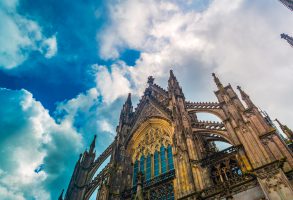Published February 25, 2005
The re-hospitalization Thursday of 84-year-old Pope John Paul II has stepped up discussions about the future leader and direction of the Roman Catholic Church, which the pontiff has led for more than 25 years.
For a closer look at the pope’s legacy, The Wall Street Journal Online spoke with George Weigel, author of “Witness to Hope,” a largely sympathetic 1999 papal biography for which he had the cooperation of the pope and Vatican officials. Mr. Weigel is a senior fellow at the Ethics and Public Policy Center, a Washington-based organization that researches the relationships religion and morals have with public policy. He is also director of its Catholic studies program. Mr. Weigel was interviewed via e-mail.
Q: As Pope John Paul II’s papacy nears its conclusion, can you characterize the church under his leadership? What have been the biggest changes in the last 25 years?
A: The Catholic Church is 1.1 billion people in every corner of the world, so it’s not easy to characterize it as a whole. But whatever the venue, I think John Paul II has inspired a more self-confident Catholicism — a Catholicism willing to open its windows to the modern world, but also insisting that the modern world open its windows to the bracing air of religious faith and transcendent moral truth. That kind of self-confident engagement with modernity wasn’t very obvious as a Catholic m.o. in 1978, when John Paul II was elected; it is, in lots of the Catholic world, today.
Q: The pope has taken what many would describe as a significant interest in matters outside the realm of the Catholic Church. For example, he is credited with inspiring the rise of Solidarity in Poland and was critical of the war in Iraq. Is this interest an inevitable result of globalization, or do you think it is more the result of something in his personality?
A: Some people might think it startling, but the Catholic Church believes that there’s nothing in the human condition that’s “outside” its sphere of interest — politics, economics and culture are all shaped by humanity’s spiritual aspirations or the debasement of those aspirations, and they’re all subject to moral scrutiny. So when the pope went to Poland in 1979 and ignited the revolution of conscience that eventually produced Solidarity and, ultimately, the revolution of 1989 in east central Europe, he wasn’t doing that as a diplomat or politician but as a pastor speaking truth to power.
His predecessors had undertaken similar initiatives, in their own ways, but the singular personality of John Paul II, plus his willingness to deploy virtually every instrument of modern communications to get his message across, has given the papacy’s ancient claim to global “reach” a new, empirical texture. I think the pope also has an unshakeable confidence in the human capacity to bend history in a better direction; he’s prepared to take risks, to throw for the touchdown rather than just playing to avoid the interception.
Q: What are areas where Pope John Paul II has been less successful, where maybe in retrospect he or the church has made a bad move and his successor might do a better job?
A: I think there’s a fairly widespread consensus in the College of Cardinals that the next pope might well take a stronger administrative hand than John Paul II has been inclined to do. A lot of Catholics are also of the opinion that the next pope is going to have to examine the system and criteria by which bishops are currently appointed. Sometimes that system works very well, but sometimes it doesn’t — and when it doesn’t, the results can be devastating.
Q: Can you tell me a little bit about responsibilities the next pope will have to pick up from Pope John Paul II, goals that haven’t yet been accomplished?
A: Even as energetic a pope as John Paul II has left a lot of work for his successor — and for the rest of the Catholic Church. The re-Christianization of Europe [where religious practice and birth rates are at all-time lows and Muslim populations are growing] would have to be high on anyone’s to-do list. In addition, John Paul II was consistently rebuffed by the Chinese government in his attempts to open a line of dialogue; his successor will keep knocking on the door, and like John Paul II, he’ll keep pressing Vietnam for a more open stance toward Catholics and Catholicism. Then there’s Cuba — it’s been seven years since John Paul II’s visit there, and assuming that Fidel Castro isn’t immortal, there will be an enormous job of repair and reinvigoration to be done in that unhappy island.
Q: The church has taken a lot of criticism for things like its stance against abortion and stem-cell research and its vow of celibacy for priests. These tenets won’t be changing any time soon; do you envision a changing of tactics led by the new pope to clarify these beliefs among lay Catholics and others?
A: The church’s opposition to abortion and embryo-destructive stem-cell research is not some peculiarly Catholic notion; it’s a first principle of natural justice that innocent human life is inviolable, and the church can no more change that than it can change the fact that two plus two equals four … . The church can always do a better job of explaining the reasoning behind its teaching on these and other issues, to be sure. But there’s no getting around the fact that the Catholic Church is going to always be a sign of contradiction in a culture that identifies freedom with doing things “my way.”
Q: Is there any interest from within the church in working to better explain the reasons for these doctrines, in hopes of changing some minds by better communication with, for example, American senators who’ve drawn criticism for going to communion despite their statements in support of abortion rights?
A: The church is always interested in clearer, more compelling explanations of its teaching, especially those that cut across the cultural grain. But in the case of pro-abortion Catholic politicians, the problem isn’t clearer communication; the problem is people who think they’re in good standing with the church when they baldly defy the church’s settled position on what Catholics regard as the gravest civil rights issues of our time. The church doesn’t need to explain its teaching more clearly to Sens. Leahy, Kerry, Kennedy, Mikulski, Biden, Durbin and all the rest; they need to pay more serious attention.
Q: Will the cardinals be considering new or different factors when it comes time to make their decision? What are the major factors traditionally considered in selecting a pope?
A: Cynics may find it hard to believe, but the first thing the cardinals will want to know about any possible candidate for pope is this: Is this a man of God — a man of holiness and hope who communicates holiness and hope? Beyond that, and indeed because of that and the effects of John Paul II, I think the next conclave will likely be the most open in history.
Nationality, ethnicity, and race will be far less important than in the past. Success as a local pastor and bishop will likely rank high as a criterion; but so will language skills: Can any future pope not speak at least some English and Spanish as well as Italian? Administrative ability counts; but then the cardinals will also be looking for someone who can revitalize moribund Catholicism in Europe, meet the challenge of Islamic radicalism, and help forge a world consensus on the biotech future that doesn’t lead us into Huxley’s “brave new world.” That’s a tall order. And it may point toward a rather lengthy conclave.
Q: When you say the conclave could be “the most open in history,” do you mean because there are many cardinals on relatively equal footing? Any chance we could see an American pope?
A: No, I mean that, because John Paul II has changed the church’s expectations of what popes are for, and the world’s, the old criteria like nationality just don’t count any more. The next pope, for example, may be Italian, but he almost certainly won’t become pope just because he’s Italian. Many people throughout the church believe Cardinal Francis George of Chicago would make a fine pope, but virtually no one thinks that’s going to happen, because there’s a great reluctance throughout the church to give the papacy to a country that is already the world’s dominant political, economic, military, and cultural force. So that’s the one exception to my “nationality doesn’t count this time” rule.
George Weigel is Distinguished Senior Fellow at the Ethics and Public Policy Center, where he holds the William E. Simon Chair in Catholic Studies.









